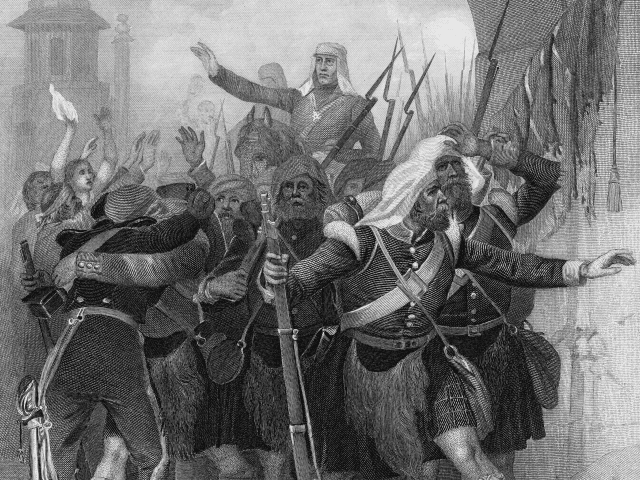Vandals who defaced a statue of British war hero Sir Henry Havelock with the words “racist” and “parasite” have been let off with a caution and a £450 charge towards cleaning costs.
Major General Sir Henry Havelock (1795–1857), a veteran of the First Anglo-Burmese War, First Anglo-Afghan War, First Anglo-Sikh War, and Anglo-Persian War, lost his life in the Sepoy Mutiny, or Indian Rebellion, of 1857, helping to relieve the besieged city of Lucknow.
A committed Christian, his highly-disciplined forces were known as “Havelock’s Saints”, and were, in his day, as renowned as Cromwell’s Ironsides, according to H. E. Marshall, of Our Island Story fame. He was remembered in particular for recapturing Cawmpore, where Indian rebels had slaughtered dozens of British women and children prisoners in the infamous Bibighar massacre.
In the present day, however, the once-beloved commander, who has memorials in Trafalgar Square, London and Mowbray Park, Sunderland, as well as an impressive tomb in Lucknow and a number of pubs, towns, and even an island in the Andamans named after him, is merely another symbol of “colonialism” and “imperialism”, with his statue in Sunderland — his hometown — being vandalised in June amid the widespread iconoclasm that emerged in tandem with the Black Lives Matter movement.
But the authorities, despite capturing the perpetrators, have opted to take very little action, letting them off with a caution and an agreement to contribute £450 towards the cleaning bill.
“On June 16, we received a report of criminal damage in Mowbray Park, Sunderland,” confirmed a Northumbria Police spokesman.
“It was reported that overnight a group of offenders had defaced a statue with graffiti.
“An investigation was subsequently launched into the incident.
“Two women – both aged 24 – and a 27-year-old man were all arrested on suspicion of causing criminal damage.
“All three admitted the offence when interviewed by officers and received a caution.”
The vandals’ treatment contrasts starkly with that of a pro-statues counter-protester in London earlier this year, who was pictured urinating beside a small memorial to radical Islamic terror victim Police Constable Keith Palmer, seemingly unwittingly, in Parliament Square.
The man turned himself after realising what he had done, and was arrested, charged, prosecuted, and imprisoned within a matter of days.

COMMENTS
Please let us know if you're having issues with commenting.